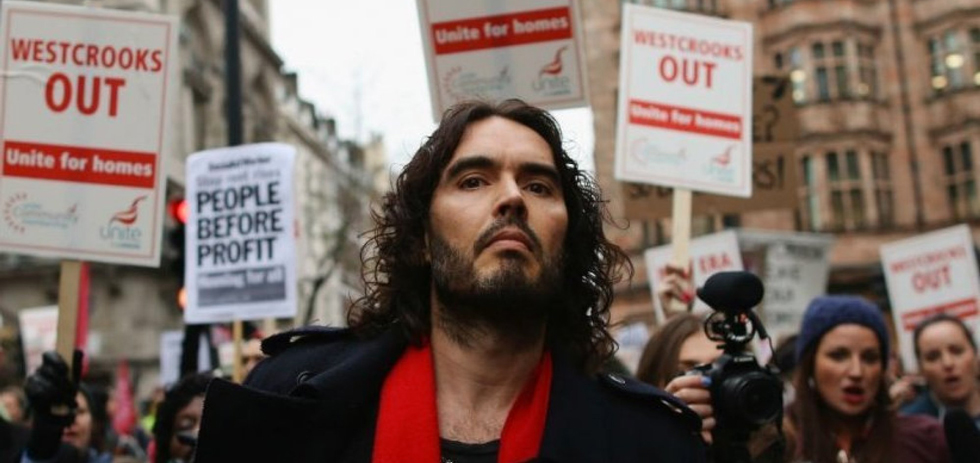
Russell Brand is trying to lead us all into revolution. Most people think this is a misplaced desire for a stand up comedian. Those people are probably right. However, The Emperor’s New Clothes , directed by Cannes favourite Michael Winterbottom, is a slightly more grounded film than I was expecting. It is thankfully not just an angry, vague and unfocused diatribe against capitalism, which I believed Brand to be capable of. Instead, it narrows in on the Global Financial Crisis of 2008 and the problem with corporate tax fraud.
Brand has always been vaguely political. Any familiarity with his career would reveal that while his stand up is not always explicitly political, he has frequently attended protests like that of the G20 summit in 2008, that he was arrested as a young heroin addict on Mayday in 2001 for stripping on top of a van, and that for most of his life, he has been a generally vocal leftie. But in recent years, he has become a major political activist. Which is weird. But he’s reasonably well intentioned, quite intelligent and so is this film.
Brand spends time Grays in Essex, where he grew up in a working class, single parent household. He talks about how the building of a shopping centre when he was a small child, led to the family run business being forced to shut down. Outside the library of his childhood, he bumps into a man he played with as a kid. This is the key to a lot of what makes the film work, and what makes Russell Brand work, in general. Britain is a society run by stiff, repressed white dudes who are alienating the general public. But Brand is appealing to many. He gets along with cleaners who work back to back shifts for terrible wages. He makes the nurses and carers working for the NHS feel comfortable and charmed. It’s a pleasure to watch and is one of the film’s greatest strengths.
One of the shining elements of the film is in the three women from the New Era estate in Hackney, London. The New Era estate provides affordable housing to almost 100 families that the film follows the campaign to stop it from being privatised by an American corporation. Brand befriends these women and shines a light on their struggle. Brand and Winterbottom let these women speak for themselves, and with the dominance of the male economists Brand speaks to, and the downtrodden women he interviews, the women from the New Era estate give much needed balance.
For all of its better qualities, it unsurprisingly has some issues. Scenes in which complex wage inequality figures are explained with the help of five year olds is grating at times. Far too much of the film follows Brand attempting to talk to the banking bosses of London, by going in and tormenting the security guards who won’t let him past the lobby. It’s clear what Brand’s intentions are, and there are a few moments of humour that come from it. But it seems a bit (for lack of a better word) rich, for multimillionaire Russell Brand to hassle the security personnel who have nothing to do with the GFC. Granted, Brand is very mild and doesn’t cause much trouble for them, but this gag comes back numerous times and gets tired fast.
There is something pandering about the tone of the film at times. The way key words like ‘inequality’ and ‘protest’ fly up on the screen in stupid floating fonts is a bizarre choice. The film struggles slightly with appealing to any one audience, but ultimately, it seems Brand and Winterbottom aimed to make a film that would explain large, sometimes rather daunting concepts like the reasons for, and ramifications of, the Global Financial Crisis or nom-domiciled tax evasion to people who didn’t necessarily have economics degrees or who aren’t generally interested in politics, which is a reasonable aspiration.
A lot about this film shouldn’t work – and some of it really doesn’t – but there were several times in the screening I attended that the sold out cinema erupted in applause. Russell Brand has some believers, this is clear.
Around the Staff
| Felix Hubble | |
